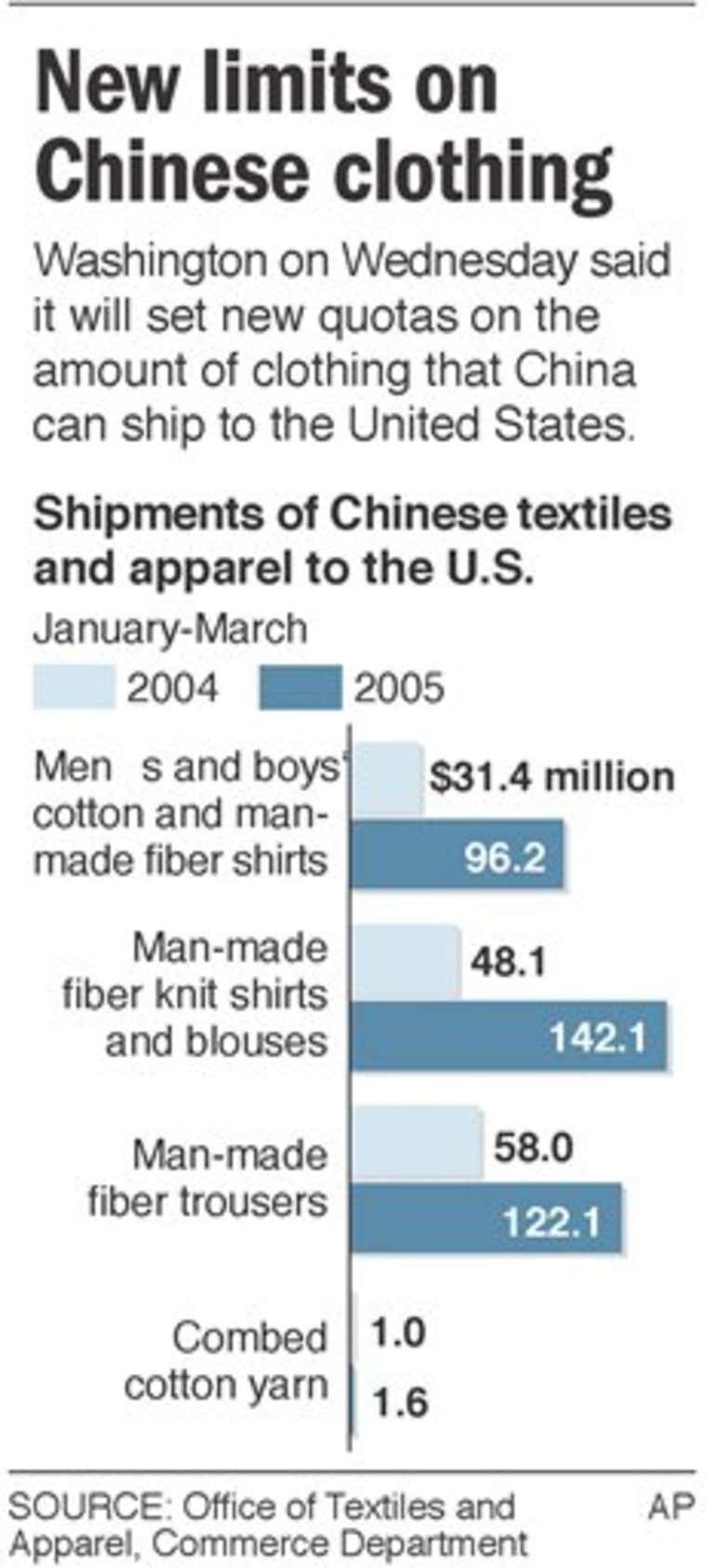China announced new tariffs on its surging textile exports on Friday in a concession aimed at easing a clash with the United States and Europe over Chinese goods flooding into their markets.
The announcement came after the United States imposed limits on imports of Chinese clothes, which have soared since a global quota system expired on Jan. 1. The European Union also is pressing China to restrain the growth of its textile exports that are conquering the racks of department stores around the world.
It also followed the Treasury Department’s announcement on Thursday that the United States will dispatch a special envoy to China to pressure Beijing to change currency and trade practices that critics blame for America’s bloated trade deficits — seen as a sign that the U.S. is taking Chinese economic threats more seriously.
“China is a responsible country, and it is for the purpose of helping establish a new world textile trade order and ease the trade friction that the government made the concession,” Sun Huaibin, a spokesman for the government-affiliated China Textile Industry Council, was quoted as saying by the official Xinhua News Agency.
The new Chinese charges take effect June 1 on 74 categories of textiles, and could increase export tariffs for most goods by up to 400 percent, Xinhua said.
Xinhua didn’t give any details, but said China now charges tariffs of 2 to 4 percent on 148 categories of textile and clothing exports. That would mean the new tariffs could range from 10 to 20 percent.

It wasn’t immediately clear whether the taxes would satisfy the United States and the EU.
Charles M. Martin, president of the American Chamber of Commerce in Beijing, said his organization welcomed the move.
“They have taken the further step of broadening the categories and then making what appears to be a very meaningful percentage increase in the tax,” Martin said. “I think this is going to have a real impact.”
China imposed a 1.3 percent export tax on textiles in December in an effort to ease foreign fears of a surge, but U.S. officials said that was too low to make a difference.
Sun said the changes could come at the expense of Chinese companies, which will have to “make sacrifices.”
The order by China’s Customs Tariff Commission also cuts the tax for knitted garment accessories, and the tax on three varieties of underwear and shorts will be reduced, Xinhua said.
The U.S. Commerce Department says imports from China this year are running at a rate 54 percent above the same period of 2004.
Measures imposed Wednesday by the United States limit growth of Chinese imports to 7.5 percent a year. They apply to men’s and boy’s cotton and man-made fiber shirts, man-made fiber trousers, man-made fiber knit shirts and blouses, and combed cotton yarn. On May 13, Washington imposed similar restrictions on Chinese-made cotton trousers, cotton knit shirts and underwear.
Then, on Thursday, Treasury Secretary John Snow appointed Olin Wethington as his special envoy on China, a new position that will focus heavily on financial diplomacy with China’s economic officials, department spokesman Tony Fratto said.
Over the past two years, the administration has tried to prod China to stop linking its currency, the yuan, to the U.S. dollar.
The Bush administration has been criticized by American manufacturers as well as lawmakers from both parties for not taking a tough enough line with Beijing.
China’s Commerce Ministry on Thursday expressed “firm opposition and strong displeasure” to the new U.S. quotas and said it might respond by taking action through the World Trade Organization.
Commerce Minister Bo Xilai this week called the restrictions “unfair.”
He said the surge was due in part to the failure of Europe and the United States to carry out promises to open markets before the worldwide quota system ended. The Chinese Foreign Ministry appealed to Washington to settle the dispute through dialogue instead of unilateral action.